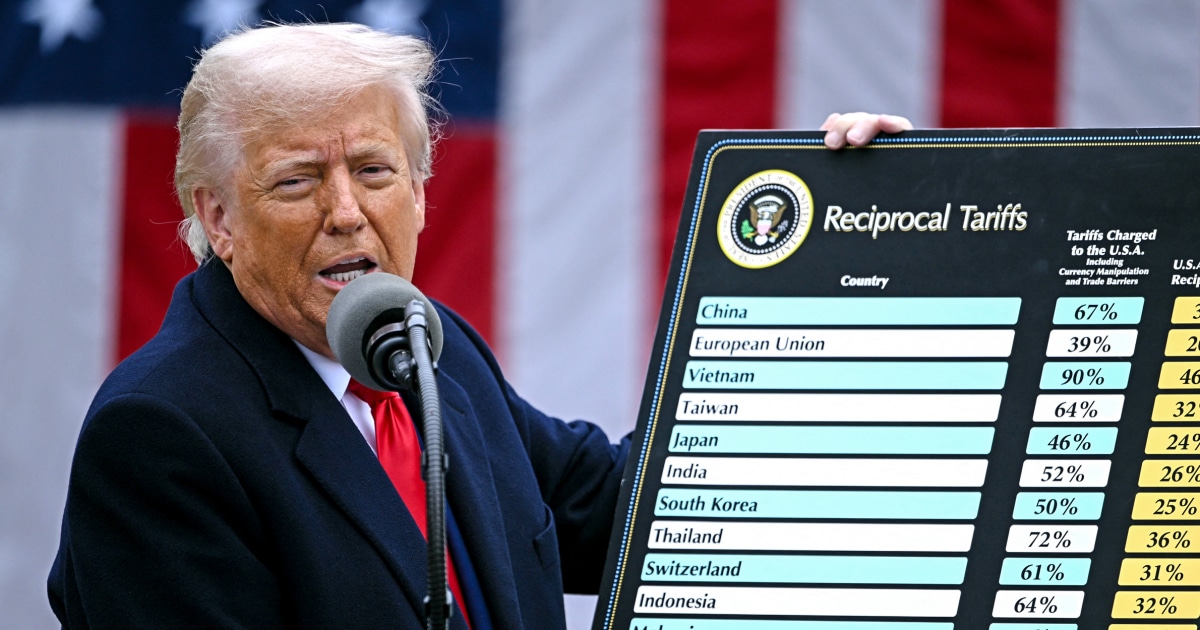
Welcome to the online version of From the Politics Desk, an evening newsletter that brings you the NBC News Politics team’s latest reporting and analysis from the White House, Capitol Hill and the campaign trail.
In today’s edition, our team looks at Trump’s tariff agenda on the eve of his deadline for reimposing some of the duties he announced and then delayed in April, as well as a legal case looming over all of the tariffs. Meanwhile, Jonathan Allen outlines the thought process that awaits Kamala Harris ahead of the 2028 election.
Sign up to receive this newsletter in your inbox every weekday here.
— Scott Bland
Trump’s tariffs face another inflection point, and a court test
President Donald Trump’s most sweeping tariffs, the ones he originally announced in April, are set to go into effect (again) on Friday. But on Thursday, his whole tariff agenda faced a stern test in federal court, NBC News’ Steve Kopack reports.
The Court of International Trade initially blocked the tariffs in late May, though they were allowed to stay in place pending appeal. The court said the law Trump cited in many of his executive orders did not “delegate an unbounded tariff authority to the President.”
It also said the tariffs did not meet the test of interceding against an “unusual and extraordinary” risk to the country, after Trump implemented them by claiming a national emergency.
All of Trump’s tariffs on major trading partners, such as Canada, Mexico, China, the European Union, Japan, India, Brazil and a handful of other countries, have been deployed using the law.
On Thursday, an appeals court took a skeptical view of the Trump administration’s argument that imposing the tariffs is well within the president’s authority under the International Emergency Economic Powers Act, per NBC News’ Ryan Balberman. Some of the judges noted that Trump’s use of the law effectively cuts Congress out of tariff policy, though the law doesn’t mention tariffs.
Meanwhile, Trump extended the deadline for negotiations with Mexico before imposing new tariffs there. He’s hit India, Brazil and South Korea with new tariffs as the deadline looms.
Altogether, as NBC News’ Rob Wile and Steve Kopack write, since the April tariff rate announcement Trump dubbed “Liberation Day,” the president backed down — and since then has steadily been reintroducing elevated tariffs at levels not seen since the 1930s.
What’s next? We’ll find out more on Friday. And more still when that appeals court makes its decision.
What Kamala Harris will weigh ahead of 2028
Analysis by Jonathan Allen
There are more than 2 million reasons for Kamala Harris not to run for president again: That’s the margin she lost by in 2024.
Moreover, no Democrat has lost a general election and come back to win the presidency since Grover Cleveland in 1892. The last Democrat to win the party’s nomination, lose the general election and come back to win the nomination four years later was Adlai Stevenson in 1956.
But what may ultimately be more compelling to Harris are the arguments for mounting a third bid for the Oval Office in 2028. In passing on a run for governor of California this week, she said that “for now,” her focus is not on elective office. That left open the door to a future campaign, and there’s only one job above the one the former vice president held most recently.
If Harris does hope to make a comeback, she will have to reckon with the most glaring deficiency of the 107-day campaign she ran in the shadow of President Joe Biden: She didn’t articulate a clear vision for the country that met the needs of voters who were dissatisfied with his leadership. While she has time to hear voters, develop an agenda and brush up her presentation skills, she would have to devote herself to executing on those goals to win a primary and the presidency.
Still, Harris would walk into a primary race with a set of advantages over most of her rivals. For starters, and for better or worse, everyone in her party knows who she is. Most candidates have to spend exorbitant amounts of time and money to build name recognition outside their states. That’s not a problem for Harris, who received more than 75 million votes in 2024.
Candidates also have to spend money on television ads and field operations, which can be prohibitively expensive. Harris would start the race with the strongest record of raising money — much of it attributable, of course, to the fact that she was the party’s nominee — and the biggest list of donors. Again, she would start the race farther down the track than prospective opponents.
In her 2024 and 2020 campaigns, the latter of which actually ended in 2019 when she ran out of money and support, Harris showed she had a lot to learn about creating and communicating a message. In 2028, she would not be dealing with the scrutiny of the national media and the exhausting crunch of day-to-day campaigning for the first time. Again, these are edges she would have over first-timers.
One question she will have to answer for herself — and it’s one that helped dissuade Hillary Clinton from running in 2020 — is whether she would still run if she were convinced she could win the nomination but was unlikely to defeat a Republican in November.
There’s plenty of time for Harris to determine her own appetite for another campaign, the electorate’s interest in her and the pure political calculation of her chances of ending up in the White House. It may be that Americans have seen the last of Harris on a ballot.
But while a Democrat last avenged a defeat in the distant past, one very present politician did it less than a year ago: Donald J. Trump.
Elon Musk gives millions to Republican super PACs ahead of the midterms
By Ben Kamisar and Bridget Bowman
Billionaire Elon Musk may be gone from President Donald Trump’s White House, but he may not be done with Republican politics.
Musk made a pair of $5 million donations on June 27 to the main super PACs backing House and Senate Republicans. That made Musk the largest individual donor to both groups in the first six months of 2025, according to new campaign finance reports filed Thursday.
The new contributions are further proof of how Musk can make a big splash in politics by putting his signature on just one check. And they raise the question of how much more there might be before the midterms, despite Musk’s messy post-White House breakup with Trump and his statements in July about starting a third party, made after the donations.
Musk’s June 27 donations supporting the Senate Leadership Fund and the Congressional Leadership Fund, the two GOP super PACs, came about a month after leaving his official post as an adviser to Trump and days before he began publicly discussing the idea of starting a new political party.
Meanwhile, other new campaign finance reports show Musk pumped $45.3 million into his own super PAC in the first six months of this year. The tech billionaire gave nearly $17.9 million directly to the group and sent another $27.4 million in in-kind contributions, with Musk covering funds for million-dollar prizes to voters who signed petitions.
🗞️ Today’s other top stories
- 📖 In her words: Harris announced that she is releasing a memoir about her failed 2024 presidential campaign. Read more →
- ✈️ Middle East visit: The White House announced that special envoy Steve Witkoff and U.S. Ambassador to Israel Mike Huckabee will travel to the Gaza Strip on Friday. Read more →
- 📣 SCOTUS talks: Conservative Justice Brett Kavanaugh defended how the Supreme Court has handled an increasing number of emergency cases brought by the Trump administration, pushing back against the criticism that the justices are failing to explain themselves. Read more →
- 🏃 On your mark: Trump signed an executive order reinstating the Presidential Fitness Test implemented in public schools from 1956 until 2013. Read more →
- 🗳️ From the campaign trail: Republican National Committee Chairman Michael Whatley officially announced that he’s running for Senate in North Carolina. Read more →
- 💊 Drug price reform: Trump sent letters to more than a dozen major drugmakers Thursday demanding that they lower the cost of prescription drugs in the U.S. within 60 days. Read more →
That’s all From the Politics Desk for now. Today’s newsletter was compiled by Scott Bland and Dylan Ebs.
If you have feedback — likes or dislikes — email us at [email protected]
And if you’re a fan, please share with everyone and anyone. They can sign up here.
